- Home
- Diana Wynne Jones
The Crown of Dalemark (UK) Page 12
The Crown of Dalemark (UK) Read online
Page 12
Mitt supposed it was all very beautiful and grand, though it was not what he was used to. It was harsher than the sea and even more obviously cruel. And empty. One of the times they stopped, Navis remarked that they had not met another soul on the way. “Everyone is at home celebrating Midsummer, I imagine,” he said. “It makes this the best time to travel and not be found.”
Mitt simply grunted, “Good.” His mind would not seem to let go of that promise he had made to Alk. In a way it was a weight off his mind. That worried him. It seemed so feeble to shelter behind a promise. Smug. Now I can do no wrong, you said, and ended up doing nothing, like a total failure. At the same time he had a gloomy feeling that the promise clamped him round as tight as that ring had, and that meant doing nothing too, and total failure that way. It was worse than Keril and the Countess.
Maewen kept rubbing the red stone of the ring on her thumb. It became quite a habit. The voice had told her to get this ring, and she had got it. Somehow that made her uneasy. She had the same fizzing, doing-wrong feeling about it that Wend had given her in the train and in the palace. Without exactly admitting it to herself, she was careful never to be alone somewhere where one of the others could not hear. She suspected, again without admitting it, that the voice would only speak to her when she was on her own. And that was all mixed up with a nasty suspicion that the voice was part of her own mind, perhaps something to do with being sent back in time. It was bound to make your mind play tricks on you.
She would have liked to talk to Mitt or Moril about it. But Mitt either rode glumly on his own or else made the kind of jokes that meant he did not feel like talking, and Moril was usually inside the cart, playing scales and pieces of tunes on different instruments. When Moril did emerge, it was to drive the cart while Hestefan sat with his legs hanging over the tailgate, practising different instruments too. Their small procession went to shards and trills of music most of the time, higher and higher into the central peaks. The cloud came damply about them. It was never easy to sleep at night.
Maewen stayed with Navis. She liked Navis. He was so efficient and imperturbable. It fascinated her the way he never let an evening go by without polishing his mare’s tack and his own boots. In the mornings he brushed his hair and his clothes, and then, unfailingly, he shaved in whatever water was going, usually icy cold from a mountain stream. And he was so sharp too. One morning Navis cut himself shaving. He exclaimed with annoyance and tried to keep the blood from running into the collar of his shirt. Wend, without a word, produced a clump of cobwebs from somewhere.
Navis said, “I thank you,” gratefully. But as he pressed the cobwebs to his chin, Maewen saw his eyes go narrow and turn for just an instant to Wend’s smooth chin. After that Navis’s countenance was as bland and composed as ever, but Maewen knew he was wondering why Wend, a grown man, never seemed to shave or grow a beard either.
It interested Maewen too. Maybe this was a sign of the Undying. But she did not like Wend enough to ask him.
From that day on, the green road was up in the clouds. Everything was moist and white. As Mitt rode in the rear, everyone ahead had turned into quiet grey shadows. A dewdrop gathered on his nose.
“I hate this!” he told the Countess-horse. It was the sort of remark he knew it would agree with.
Moril hopped out of the cart and walked beside Maewen’s horse. She did not blame him. It was warmer walking, and no one was going fast in this fog. After a while she dismounted herself, and they walked side by side, talking, leading her horse. Maewen was surprised and glad at how ready Moril was to talk. He told her how it felt to lead a Singer’s life, and the new way he wanted to treat the old songs, and about his plans for the future. She encouraged him. Ever since she had seen that portrait, she had had an ache somewhere about Moril. And without putting it to herself that she was once again trying to change history, she wanted badly to comfort him. It would be wonderful if she got back to the Tannoreth Palace to find that the portrait smiled instead of looking wretched.
Coming behind, Mitt honestly tried not to hear what was obviously a private conversation. He wondered about pushing past and riding on ahead where he could see the sketchy grey bulk of the cart, but the road was in a narrow ravine here, with wet black rocks close on either side, and it would have meant forcing his way through beside Moril or the horse, which would remind both of them that he was there, overhearing. He could see Moril’s pale face turned eagerly to Noreth as he told her about the dangers in the South, where Singers were often called upon to carry illegal messages. Noreth certainly had a way with her, Mitt thought ruefully. She drew me out the same way. Now Moril was telling her how he had come North last year after his father had been killed.
Moril’s voice cracked a little. Mitt reined back the Countess-horse and tried to keep well behind. He knew that if he were to tell Noreth about his father, he would want no one listening in. But the horse had a long rangy stride, and he kept catching up. He was up close behind again in time to hear Moril explaining that Hestefan was no relation. “He came to Hannart while I was there,” Moril said. “And I asked him to take me with him. We went off secretly because I knew Earl Keril wanted me to stay.”
Keril’s name was enough to send Mitt backwards again. This time he dismounted and walked too. It was warmer that way, as well as slower. He tried to keep the three shapes ahead looking like pale grey shadows, out of hearing and almost out of sight. But Mitt’s stride was as long and rangy as the Countess-horse’s, and somehow, before long, he was able to overhear again.
“I told Hestefan I’d follow you on my own if he didn’t want to come,” Moril was saying. “But he said he’d better come because great events afoot need a Singer to record them. I’m sorry he’s so neutral. I’m not. I think it’s like the time Osfameron followed the Adon. Did you know Osfameron was my ancestor? My big cwidder used to be his.”
Something about this seemed to make Noreth modest and uncomfortable. Mitt could hear her trying to change the subject. He waited for them to get ahead again. The mist seemed to be thicker here, perhaps because the ravine had widened. They were going past a chain of dimly seen lakes, each one like faintly rippled milk under the fog. Mitt thought he kept well behind while they passed three of these lakes, but he must have caught up again gradually, because he was able to hear Moril’s voice then, evidently in the middle of something upsetting.
Noreth’s answer floated back clearly. “But Navis couldn’t possibly have known about Olob when he shot Dapple. Be reasonable, Moril.”
“I know,” Moril answered. “I didn’t say it was reasonable. Anyway, he’s Earl Hadd’s son, and I hate him for that.”
“He couldn’t help being born,” Maewen said patiently. “And Mitt’s definitely not a noble, and he didn’t shoot your horse. You can’t just lump him in with Navis like that.”
“Can’t I just!” Moril said. “I hate all Southerners.” For a while neither of them said anything else. Mitt, walking on the soft grass beside the milky lake, thought they had gone out of hearing again. Then Moril said, “I’ll tell you why I really dislike Mitt. He makes jokes all the time – about serious things.”
I do not so! Mitt thought indignantly. It occurred to him that though Noreth might have forgotten he was there, Moril probably knew perfectly well.
“A lot of Southerners do that,” Maewen said. “It doesn’t mean they aren’t serious.”
“Mitt’s never serious,” Moril said contemptuously. “Look at the way he joked when he was bearing witness about the One’s statue. That made me so angry I broke my rule. I told you how I swore not to use the power of my cwidder. Well, I knew it was serious that you’d been given a sign to set out on the King’s Road. So when you told everyone to follow you, I started to play the song with the power, to show people that it was important and they shouldn’t follow you unless they really meant it.”
Noreth, Mitt noticed, did not point out that the song seemed to have misfired a little. She said, “That was nice of you.”
And Mitt wondered if perhaps Moril did not know he was just behind them after all.
“You should watch Mitt,” Moril said. “He’s trying to suck up to you, the way all Southerners do. But he’s shifty, too. He may even have been sent North as a spy.”
Right! Mitt thought. That does it! Moril knew he was there. He had no doubt of it now.
Maewen said, “Now you’re being ridiculous, Moril. I shan’t listen to you if you’re going to talk like that.”
Mitt thought it was nice of her, but he was not in the least mollified. As the mist began to thin to a moist yellow, and Navis shouted back that there was a good place to stop for a nuncheon, Mitt thought, If that little sneak says one more thing! He towed the Countess-horse out of the mist to find everyone else sitting on wet rocks unpacking bread, cheese and pickled cherries. Here, the ravine with the lakes had opened into what was almost a meadow. The horses moved about in it, trying to crop the grass, half hidden in golden shifting mist that might have been the top of a cloud.
The bread was stale. Everyone ate quickly and packed up again. “We’re at the highest point the green roads go, lady,” Wend told Maewen. “From now on it is down towards Gardale.”
“Oh good,” she said. “Real food. If I eat one more pickled cherry, I might scream. Or does anyone know a way to cook them to make a change?”
“I might have a notion,” Mitt said. “On a skewer, like, with cheese and a bit of that bacon.”
They were all moving about, getting ready to go on. Moril gave Maewen a meaning look as he went towards the cart. “See what I mean? Sucking up to you.”
Mitt went after Moril with giant strides, roaring, “You take that back, you little slime-bag!”
Moril turned round against the tail of the cart. He was prepared. He was holding his cwidder in front of him like a shield. “What should I take back?” he said coolly. “Didn’t someone order you to suck up to her?”
There was enough shrewd truth in this to make Mitt even angrier. The cwidder made a poor, fragile shield, but a year in Aberath had taught Mitt the value of a beautiful old instrument like that. He knew it was less of a sin to break Moril instead. “You little coward!” he said, grabbing for Moril’s arm.
Moril swung aside and tried to pluck a chord on the cwidder. Mitt’s hand, lashing out in what was now the wrong direction, hit the strings as Moril’s fingers plucked them. The cwidder boomed. It was a mighty chord, and it seemed to boom on and on. Mitt felt the hairs on his outstretched arm stand upright. What Moril felt he had no idea, but he felt something strongly. There was shock all over his white face. To Mitt it was as if he had just punched a cwidder made of solid granite.
Then they were both in rushing cold water up to the shoulders.
The other four travellers scrambled for the panicking animals. Wend seized the mule’s bridle on the other side from Hestefan, and together they hauled mule and cart through the rushing shallows and out on to the strip of turf beside the rocks. The three horses were all further in. Maewen was soaked all over as Mitt’s horse floundered past her and galloped away down the bank, but she managed to catch her own before it followed Mitt’s. Navis was just beyond her, soothing his mare while he dragged her through rolling stones and racing current. Maewen and he made it to the cliffside almost together, where they turned, both dripping, and stared at a sudden mighty river where there had only been grass before.
The river was a good half-mile wide and one of those tricky, spiteful stretches of water, full of upreared rocks and vicious back-eddies, flowing with a force that made it hard to stand up in. Mitt and Moril were a long way out in it, much further away than Maewen had expected, staggering this way and that and, as far as she could see, still screaming insults at one another in spite of it. At the moment when she looked, they were submerged to Moril’s shoulders and Mitt’s chest. Moril had his cwidder held high in both hands. He was raising a bubbling wave of water under his chin as he pushed and surged, and almost fell sideways into a hidden pothole, trying to make his way to the nearest big rock. She could hear Mitt’s voice faintly through the incredible noise of the water, roaring at Moril.
“Stop them, somebody!” she said.
Mitt surged after Moril, grabbing angrily. The result was that Mitt went sideways into the same hidden pothole and vanished underwater. He emerged almost at once, flailing sheets of spray and yelling with rage.
“A bit hard to do anything from here,” Navis observed.
Moril made it to the rock. He put the cwidder carefully down on a dry space and, scrabbling and hauling, managed to drag himself on to the rock too, brown and skinny with wet as a drowned weasel. Mitt was still in the water with a white wave frilling round his neck. Moril knelt on the rock and called down at him derisively.
“If you want to stop this,” Hestefan said, coming up beside Navis, “someone must go and take that cwidder away. It’s a thing of great power. Moril ought not to be trusted with the thing.”
Navis shrugged. “Really? I should never have guessed. And how do you suggest we remove the cwidder? But while you consider that problem, please do not underestimate Mitt. I have reason to believe he can call on power of his own.”
Maewen thought both of them were being utterly unfeeling. She looked at Wend for help. Wend was pale, subdued and awe-stricken. “It’s not for any of us to interfere, lady,” he said. “They have put themselves in the hands of the One himself.”
“O-oh!” Maewen said. “Fiddlestick!”
She looked helplessly out at that distant rock.
Out there, up to the neck in racing river, Mitt said, “What do you mean, look what I made you do? Of all the feeble, whingeing things to say! It’s your flaming cwidder that did this!”
To his surprise Moril seemed quite ashamed. But his white face remained mulishly set. “I meant the rest of it,” he said. “You try to get on this rock, and I’ll kick you off!”
“And a fat lot of good it’s going to do us, each squatting on a different rock!” Mitt bawled up at him. “We got into this river together. It stands to reason it’s going to take both of us to get out.”
Moril looked from bank to bank of the improbable river. Mitt had already looked. He knew water. He had been brought up with it, both fresh and salt, and it was kind of instinctive with him. He hoped what Moril saw would bring him to his senses. Wisps of fog hung over the shrilling water, making it hard to see far, but it was possible to pick out a sheer, dark cliff on either side. Trees clung to niches in the cliffs here and there, so high that at first glance they looked like bushes. And those were the only other living things in sight. There was no sign of Navis, Hestefan and Wend, nor of the horses and the mule. As he discovered this, Moril’s face unbunched into wide-eyed alarm.
Good, Mitt thought. His teeth were beginning to chatter, and this river scared him badly. He knew it. He had seen it before while he sat with Noreth by the waystone above Adenmouth. This one had the same smell, the same feel to it, and the thing which scared him most was that it did not seem to exist. “Listen,” Mitt called up to Moril, “I’ll give you my life history if it makes you feel better. I know you hate us Southerners – I heard what you said to Noreth – but I swear to Ammet you got no reason to hate me!”
Moril went on hands and knees and leant down to look at him. Mitt actually had hopes that Moril was going to help him scramble up, until Moril said, “Yes, I knew you’d listen in. I was trying to annoy you.”
Mitt roared with frustration. “Flaming Ammet! What’s wrong with you? I think your mind’s mixed up! You behave like the whole world’s out to get you!”
That got home to Moril. He was pinched and staring and hurt for the time it took to draw breath, but then he went calm again. “And you’re jealous,” he said. “I meant you to be.”
Jealous? The word seemed to take all the heat out of Mitt’s body. He felt as cold as the water rushing round him. An instant later the heat came back, tenfold. He could feel his face burning above the frill of water round his ch
in. He was surprised the frill didn’t start to steam. He tried to tell himself that he hadn’t a clue why one word should affect him like this, but if one of his own words could affect Moril as badly, why not? Moril’s mind was mixed up. And Mitt had a thousand clues about his own condition: Rith’s cheerful freckly face and man-to-man way of talking and then Noreth, the young lady in the fashionable dress who was so nervous about what she had to do, and then the girl trying to hold them all together on the road. As soon as he picked up these clues, Mitt could look up into Moril’s pinched and greenish face and see that some part of the mix-up in Moril’s mind was the same thing. The same clues were there. They had both been unhappy. They had both fallen at the same young lady’s feet. Both of us! Mitt thought bitterly. How flaming stupid!
“All right!” he shouted up at Moril. “So I am jealous! So are you! Calf love, they call it. And it’s not going to get either of us anywhere!”
A surge of pink swept across Moril’s face. He blinked. “I … wasn’t only angry about that,” he said.
“Neither was I!” Mitt shouted back. “Let me come up, and let’s have it out, shall we?”
To Mitt’s extreme relief, Moril at last held out a thin wet hand to help him up. Gripping it, Mitt hauled himself upwards, skidding and slipping and clawing at the rock with his other hand. His boots weighed like lead, and the sodden leather of his clothes seemed to have the whole river in them. As Mitt floundered on to the top of the boulder, dripping and panting, Moril hurriedly crouched in front of his cwidder.
“Don’t get it wet!”
That made sense. If the cwidder was spoilt, they would be in this for good. Mitt stood at the edge of the rock and let the water course and sluice and trickle off him where it did no harm. He was freezing, but to his surprise the air was warm. He could see himself beginning to steam as he said, “Well then. What’s biting you?”

 Fire and Hemlock
Fire and Hemlock Reflections: On the Magic of Writing
Reflections: On the Magic of Writing The Game
The Game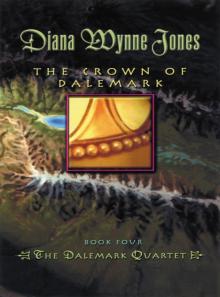 The Crown of Dalemark
The Crown of Dalemark Deep Secret
Deep Secret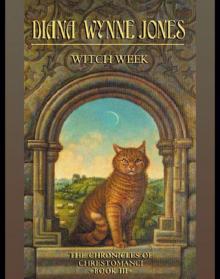 Witch Week
Witch Week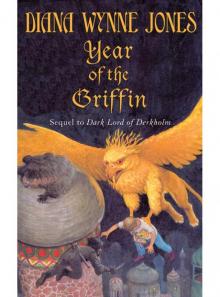 Year of the Griffin
Year of the Griffin Wild Robert
Wild Robert Earwig and the Witch
Earwig and the Witch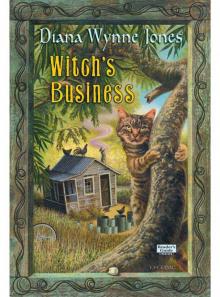 Witch's Business
Witch's Business Dogsbody
Dogsbody Caribbean Cruising
Caribbean Cruising Cart and Cwidder
Cart and Cwidder Conrad's Fate
Conrad's Fate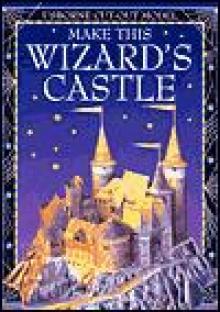 Howl's Moving Castle
Howl's Moving Castle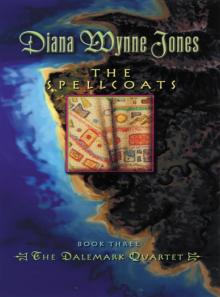 The Spellcoats
The Spellcoats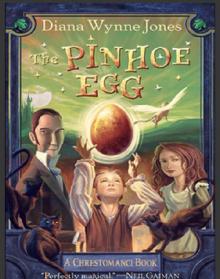 The Pinhoe Egg
The Pinhoe Egg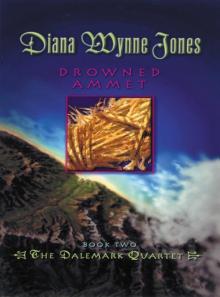 Drowned Ammet
Drowned Ammet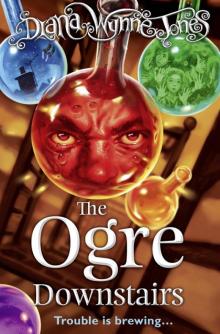 The Ogre Downstairs
The Ogre Downstairs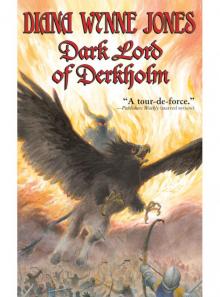 Dark Lord of Derkholm
Dark Lord of Derkholm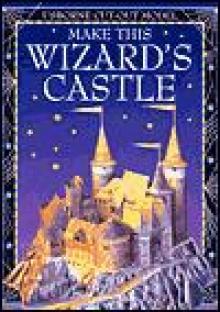 Castle in the Air
Castle in the Air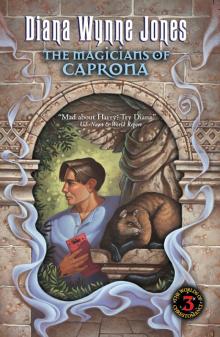 The Magicians of Caprona
The Magicians of Caprona A Tale of Time City
A Tale of Time City The Lives of Christopher Chant
The Lives of Christopher Chant The Magicians of Caprona (UK)
The Magicians of Caprona (UK)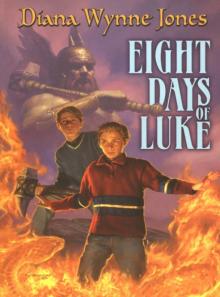 Eight Days of Luke
Eight Days of Luke Conrad's Fate (UK)
Conrad's Fate (UK) A Sudden Wild Magic
A Sudden Wild Magic Mixed Magics (UK)
Mixed Magics (UK)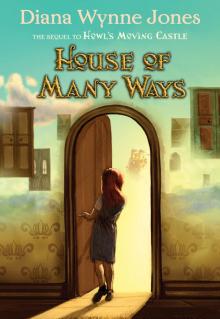 House of Many Ways
House of Many Ways Witch Week (UK)
Witch Week (UK) The Homeward Bounders
The Homeward Bounders The Merlin Conspiracy
The Merlin Conspiracy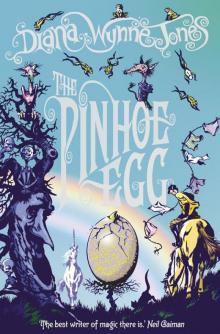 The Pinhoe Egg (UK)
The Pinhoe Egg (UK) The Time of the Ghost
The Time of the Ghost Hexwood
Hexwood Enchanted Glass
Enchanted Glass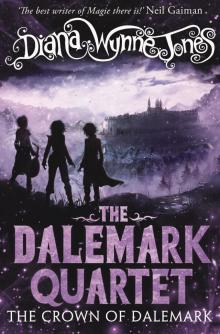 The Crown of Dalemark (UK)
The Crown of Dalemark (UK)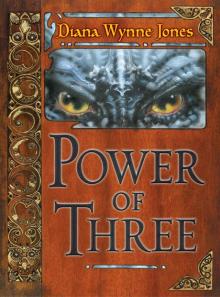 Power of Three
Power of Three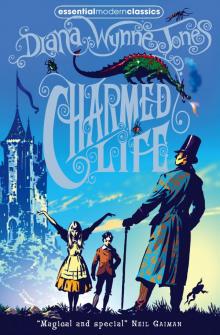 Charmed Life (UK)
Charmed Life (UK)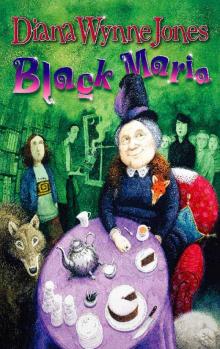 Black Maria
Black Maria The Islands of Chaldea
The Islands of Chaldea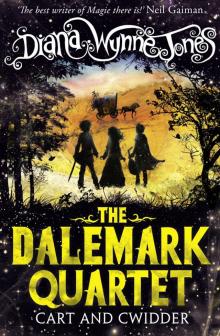 Cart and Cwidder (UK)
Cart and Cwidder (UK)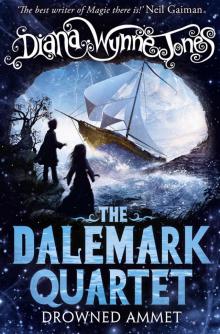 Drowned Ammet (UK)
Drowned Ammet (UK) Charmed Life
Charmed Life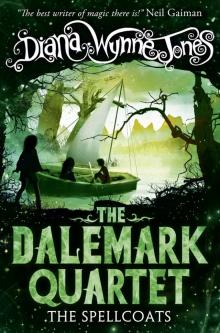 The Spellcoats (UK)
The Spellcoats (UK) Believing Is Seeing
Believing Is Seeing Samantha's Diary
Samantha's Diary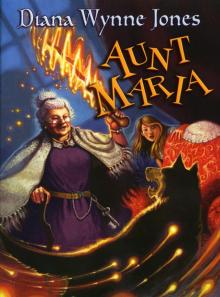 Aunt Maria
Aunt Maria Vile Visitors
Vile Visitors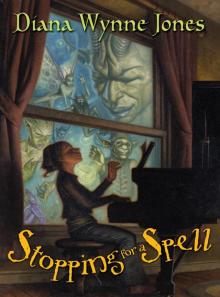 Stopping for a Spell
Stopping for a Spell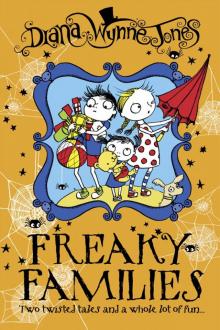 Freaky Families
Freaky Families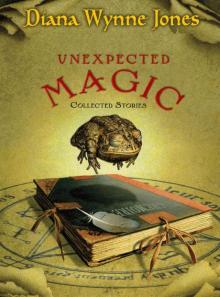 Unexpected Magic
Unexpected Magic Reflections
Reflections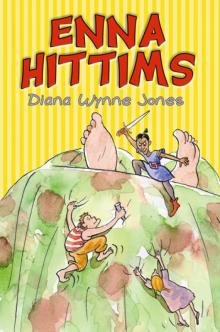 Enna Hittms
Enna Hittms Mixed Magics: Four Tales of Chrestomanci
Mixed Magics: Four Tales of Chrestomanci